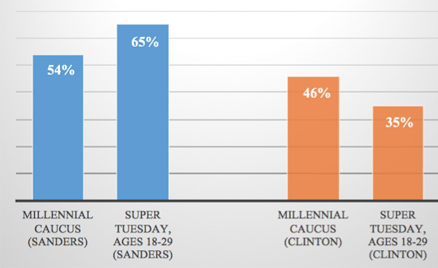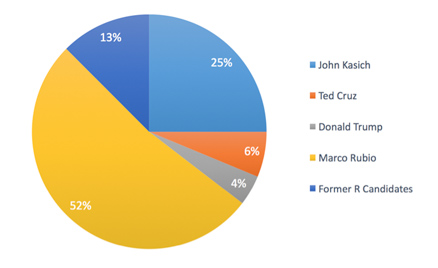Millennial Caucus: Results from UVA’s “Super Tuesday”
 CBS News and Millennial Caucus Data
CBS News and Millennial Caucus Data
 Millennial Caucus Survey Data
Millennial Caucus Survey Data
An estimated 1.8 million people voted in the March 1st “Super Tuesday” primaries and caucuses. The youth vote (18- to 29-year-olds) tripled relative to previous years in some cases. Virginia, in particular, saw a 5-percent increase compared to 2008 with young Republican turnout being especially high.
These trends illustrate why presidential candidate are making increasingly enthusiastic overtures to what is now more than ever a key voting bloc.
For its part, in a recent presidential straw poll, University of Virginia undergraduates differed heavily from the 18- to 29-year-old national average. They leaned heavily towards ‘establishment-lane’ candidates on the right and gave a slight edge to Senator Bernie Sanders of Vermont on the left. Both results defied expectations in their own ways.
Per CBS News, Bernie Sanders won the millennial vote in all seven of this year’s Super Tuesday contests. His smallest margin of victory was 13 percent, and it climbed as high as 60 percent in Vermont.
By contrast, UVA students are also “feeling the Bern,” but not quite as enthusiastically. According to a February Miller Center-UVA undergraduate poll, Sanders edged out Clinton 53-47 percent. That result is at least seven points lower than the statewide contests on March 1st.
These results should be seen as encouraging for the Clinton campaign, slightly challenging the idea that Clinton is unable to energize young voters in comparison to Sanders.
Undergraduates picking Republican candidates also continued to belie national trends.
According to Tufts University data, businessman Donald Trump is not garnering nearly as much support among millennials as he is among older voters so far. He is still winning in some states, but by thinner margins than with the electorate as a whole. In Virginia, young primary-goers preferred Senators Ted Cruz and Marco Rubio.
Opinion on Grounds held true in the case of Rubio, but differed sharply otherwise.
Republican voters at UVA favored Rubio an overwhelming 52 percent. Ohio Governor John Kasich followed with 25 percent. Cruz and Trump together managed just 10 percent.
Between them, Kasich and Rubio have won just one state (Rubio won Minnesota). Making a play for the youth vote may be a sound strategy going forward as both look to find some kind of a foothold in the race.
Overall, the results show that the current presumptive nominees, Clinton and Trump, have some ways to go to win millennial support. Neither has made the same impact as Rubio or Sanders nationally, statewide, or at UVA.
According to one voter speaking to Politico, millennials are not as caught up in Trump’s supposed mass appeal: “Outside of the mob mentality, outside of the crowds of people, you have to get them away from that. And then they’ll admit that there’s nothing there.”
Should the front-runners stay the course and win their respective party’s nominations in July, both will be looking to make a more successful appeal to young voters This may turn out to be a pivotal portion of the electorate come November, and neither has made the inroads they would like so far.
The Millennial Caucus is a recurring survey being conducted by second-year Uma Mengale and third-year Darby Hobbs in conjunction with the Miller Center. If you are an undergraduate at UVA and wish to join in on the conversation, please sign up.
This poll was administered to students on February 8, 2016, from different organizations and majors, sent out via email to the organizations’ listservs. The response rate was 14% (+/- 4). For more information on the methodology of our survey, please visit About the Millennial Caucus.
Students will be polled periodically to gather their opinions on important national issues in addition to their evolving preferences in the race for the White House. Stay up to date by visiting the First Year site.